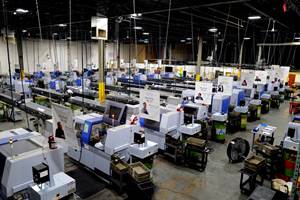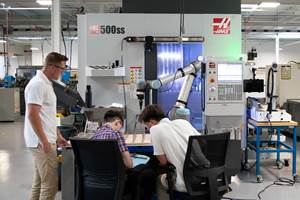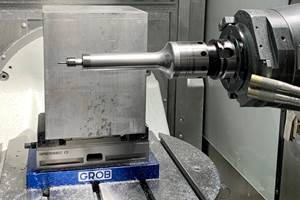Growing with the Times (and Customer Demands)
Faced with the choice to innovate and invest or be left behind, Turbine Technologies chose to invest in EDM machines from Makino.
Share




What do you do when your biggest customers ask for more advanced manufacturing capabilities closer to their assembly plants? According to Tyler Burke, CEO of Turbine Technologies Inc., “You’re either going to innovate and invest or you’re going to be rationalized.” To grow his business, he made the decision to invest in EDMs from Makino Inc. (Mason, Ohio) and find new ways to support his customers.
In 2013, Mr. Burke assumed ownership of the 50-year-old machine shop his father built in Farmington, Connecticut, producing components for commercial and military applications that typically require machining on one of the company’s approximately 100 EDMs to create profiles and cooling holes in turbine blades and vanes. While the shop’s older EDMs could still make parts to meet legacy customer requirements, the company was not equipped for growth. Its customers wanted Turbine Technologies to help them take advantage of the global expansion in the aerospace and power-generation markets by increasing production, improving quality and speeding delivery.
To do this, Mr. Burke and his new management team considered ways to automate operations, integrate individual machines into manufacturing cells, and connect them to other business or production systems. In short, they were determined not to be left behind as machine tool technology and manufacturing software become networked, cyber-physical production systems in the Industrial Internet of things (IIoT).
This led Turbine Technologies to invest in high-performance sinker, hole-drilling and wire EDMs from Makino; to set up a second shop in Greenville, South Carolina, outfitted with additional Makino EDMs; and to devise new manufacturing processes. SST—Single Source Technology of Mason, Ohio, became its sole supplier of consumables.
In 2015, the company updated its 40,000-square-foot Connecticut site with two EDBV3 hole-drilling EDMs and a larger EDBV8 model. These machines are specifically designed to produce cooling holes and diffuser shapes within blades and vanes for aerospace and power-generation applications. Features include a tooling system that integrates both automatic tool change and guide changing into one common assembly that can be exchanged in 30 seconds, and an integrated two-axis rotary table for five-axis positioning. Preprogrammed cycles for diffuser shapes, intelligent electrode length management, and internal water quality and temperature control systems are designed to increase efficiency.
To improve performance reliability in small-diameter hole drilling, the machines employ a 1,000-rpm rotating spindle with high-pressure flushing to produce holes as small as 0.008 inch (0.200 mm) in diameter. An automatic middle guide arm supports the pipe electrode during operation and prevents it from whipping or bending.
To avoid scrapping parts, Mr. Burke says his company sets a higher target for tolerances and surface quality than is required. For example, for cooling holes in a nickel alloy shroud with a true position requirement of no more than 0.02 inch, Turbine Technologies will find a way to drill the holes with a true position of 0.01 inch.
Although some of its EDMs date back to the 1960s, the company continues to use those non-automated machines for legacy aerospace and industrial gas turbine parts, even though each machine requires an operator. On the other hand, all the Makino machines are equipped with an automatic toolchanger and standardized pneumatic workholding fixtures to extend unattended operation. In a new Makino cell, four EDMs are operated by one employee who loads and unloads parts while a second employee cleans and inspects the parts. The machines also can be loaded and unloaded by robots, making further automation a possibility.
Turbine Technologies is in the process of bringing two more EDBV3s and two EDAF2 sinker EDMs online that integrate the dielectric reservoir into the base casting of the machine to reduce floor-space requirements while improving thermal stability.
Graphite electrodes for the EDAF2s and the legacy sinker EDMs are now being made on a Makino F3 VMC. This graphite machining center is outfitted with a rotary-axis table to provide rigidity for chatter-free cutting; agility for high-speed hard milling; and accuracies for tight-tolerance blends and matches typical of complex, 3D-contoured geometry. The F3 features Makino’s SGI geometric intelligence software for high-feed-rate, tight-tolerance machining of complex, 3D-contoured shapes involving continuous tiny blocks of NC data. Toolmaker Vern Hussey says he now programs the F3 to easily cut a radius that previously required manual benchwork because the company’s older mills could not accurately produce the feature.
For larger parts, the company invested in a Makino U1310 wire EDM that provides support and rigidity for workpieces weighing as much as 13,228 pounds (6,000 kg). Makino’s proprietary high-energy applied technology (HEAT) uses two independent CNC flush pumps to reduce cycle time and wire consumption. The machine enables the shop to consistently achieve a surface quality of 20 Ra for the part, exceeding 80-Ra requirements, says engineering technician Jary Dzierlatka.
In South Carolina, the 28,000-square-foot shop houses more than a half-dozen new Makino EDAF3 sinker EDMs located across the aisle from even more recently purchased high-speed hole EDMs. Although the older EDMs were certified for production of an aerospace turbine shroud, which requires a complex hook-shaped feature, the shop has since developed a more efficient process for machining those shroud features using the EDAF3 machines.
“In side-by-side testing, burning the hook shape into the nickel alloy is significantly reduced on the EDAF3s, and the cycle time has been reduced while also extending electrode life from four parts per electrode to 16 parts,” says engineering manager Justin Lamprey. Working with the aerospace engineering team from Makino and SST, Mr. Lamprey says Turbine Technologies expects to continue to improve programming to lower the cycle time for the shrouds.
Also in South Carolina, the company invested in two EDBV8s and several smaller EDBV3s for drilling cooling holes in the shrouds, some with diameters as small as 0.06 inch.
All but one of the new machines feature Makino’s Hyper-i control, a unified control system that provides intuitive, intelligent and interactive functions with the touchscreen functionality of smartphones and tablets. This familiar interface is a critical reason why Turbine Technologies chose Makino as its machine tool manufacturer. Operators experienced on the company’s older EDM technology have quickly learned to run the Makino machines because the Hyper-i provides simple-to-follow fingertip controls. Machining procedures and how-to videos are immediately available for each setting and process. Engineers who do not operate the machines on a regular basis can easily use the Hyper-i control to test or troubleshoot programming as well as develop processes for new applications.
“I never have to question whether I can do something with these machines. We spend months dialing in settings on the older machines. With the Hyper-i control, we are dialed in the first time. We’re up and cutting quickly. We have seven new parts in development. It’s a huge timesaver being able to step up to the Hyper-i to set up and test the programming right on the control,” Mr. Lamprey says.
Related Content
Inside a CNC-Machined Gothic Monastery in Wyoming
An inside look into the Carmelite Monks of Wyoming, who are combining centuries-old Gothic architectural principles with modern CNC machining to build a monastery in the mountains of Wyoming.
Read MoreInside the Premium Machine Shop Making Fasteners
AMPG can’t help but take risks — its management doesn’t know how to run machines. But these risks have enabled it to become a runaway success in its market.
Read MoreCNC Machine Shop Honored for Automation, Machine Monitoring
From cobots to machine monitoring, this Top Shop honoree shows that machining technology is about more than the machine tool.
Read MoreHigh RPM Spindles: 5 Advantages for 5-axis CNC Machines
Explore five crucial ways equipping 5-axis CNC machines with Air Turbine Spindles® can achieve the speeds necessary to overcome manufacturing challenges.
Read MoreRead Next
5 Rules of Thumb for Buying CNC Machine Tools
Use these tips to carefully plan your machine tool purchases and to avoid regretting your decision later.
Read MoreSetting Up the Building Blocks for a Digital Factory
Woodward Inc. spent over a year developing an API to connect machines to its digital factory. Caron Engineering’s MiConnect has cut most of this process while also granting the shop greater access to machine information.
Read MoreRegistration Now Open for the Precision Machining Technology Show (PMTS) 2025
The precision machining industry’s premier event returns to Cleveland, OH, April 1-3.
Read More

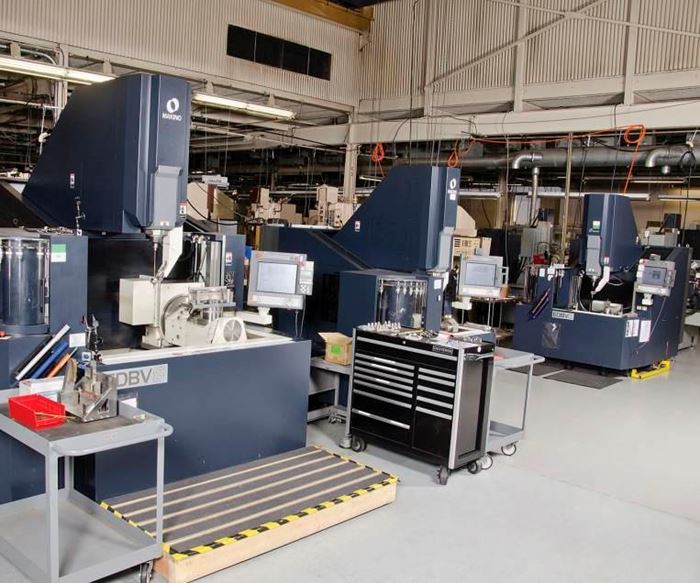
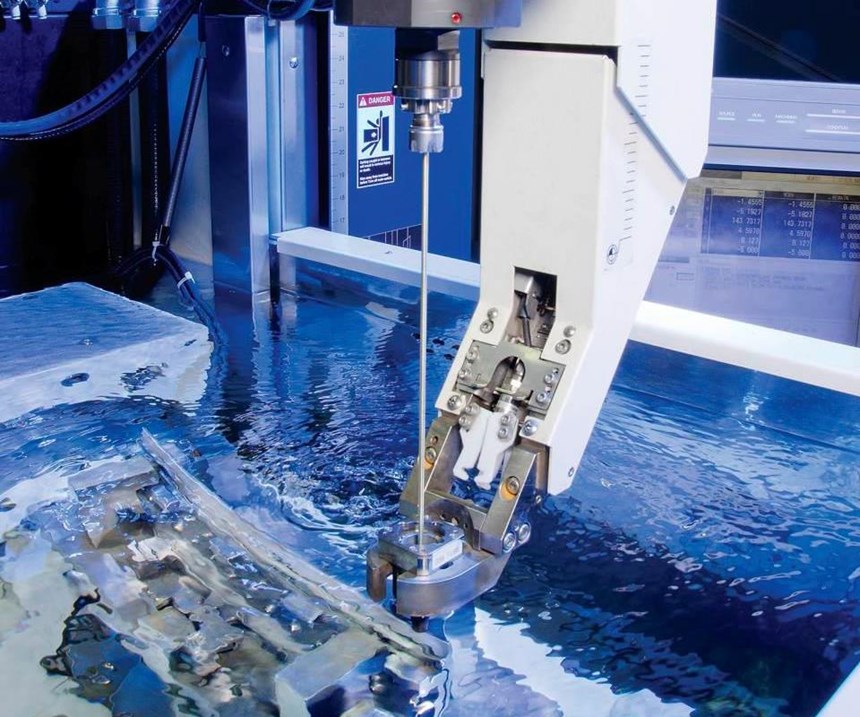
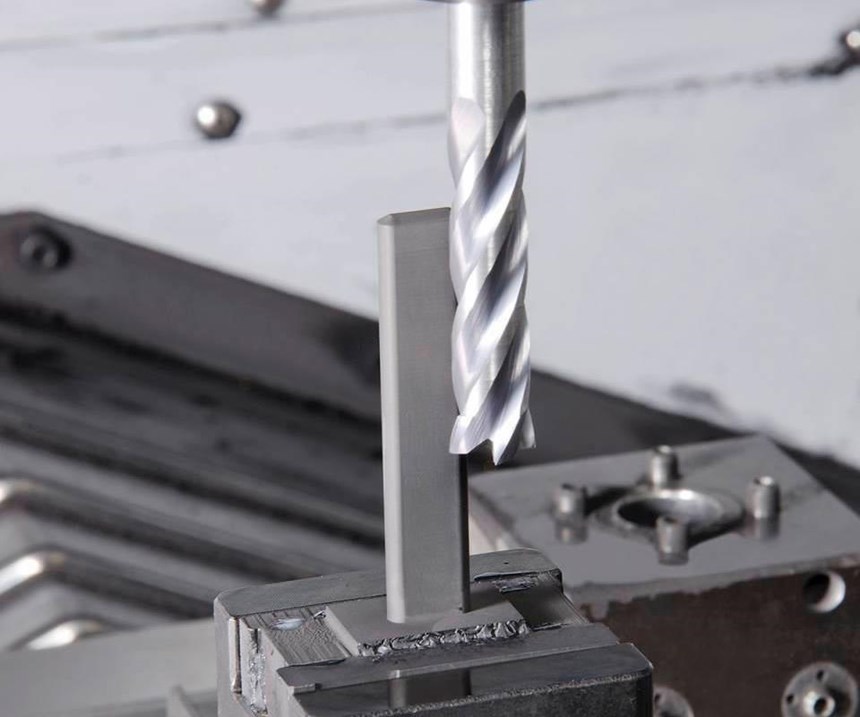
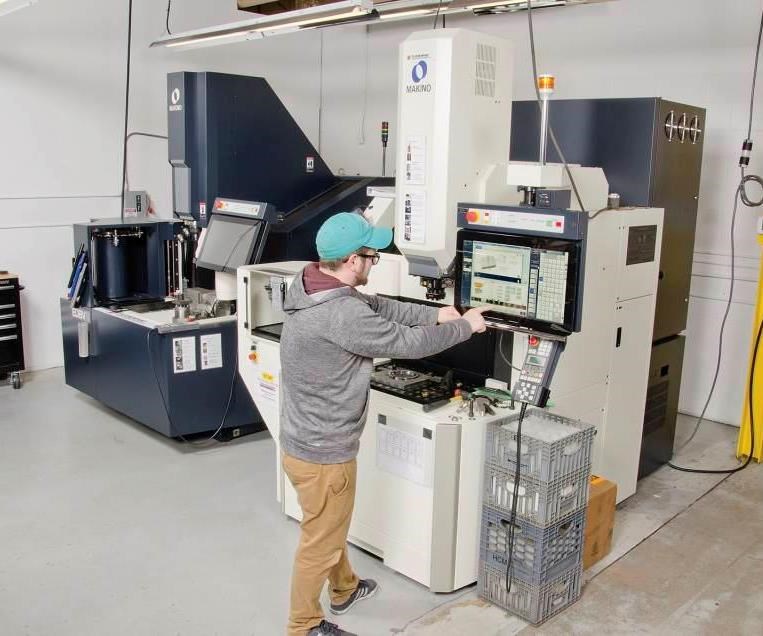
























.jpg;maxWidth=300;quality=90)







